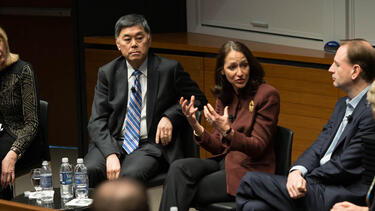Is Innovation Enough to Make People Healthier?
The Yale School of Management brought together the FDA commissioner, the head of a health insurance company, the CEO of an Internet media empire, and the incoming chief of England’s National Health System to discuss the future of healthcare innovation and the state of care itself.

Dr. Benjamin Chu, Dr. Margaret Hamburg, Arianna Huffington, and Simon Stevens answered questions from moderator Elizabeth Bradley PhD ’96, professor of public health and director of Global Health Initiatives at the Yale School of Public Health, at the Business + Society conference, held to mark the opening of Yale SOM’s Edward P. Evans Hall. Among other issues, the group discussed how the problems with our health go far beyond our medical system; innovation as a potential solution, and its shortcomings; and how the complexity of the system introduces additional uncertainties.
The Problems of the Healthcare System
Bradley asked the panel how a country that invests $135 billion each year in medical research and development lags behind much of the world in the health of its population. Is the issue improper use of resources or something completely different?
Simon Stevens, president of global health for the UnitedHealth Group and CEO-designate of NHS England: “You’re three times more likely to have your leg cut off because of diabetes not properly managed [in the U.S.] than in any other industrialized country. Considering we’re spending $2.8 trillion per year it seems curious.”
Arianna Huffington, head of Huffington Post Media Group: “We’re in a permanent state of fight or flight, which is magnified by our addiction to technology, which means we can’t disconnect. We are at a tipping point where the way we live is not sustainable. Down the road, no amount of healthcare or healthcare technology will be able to save us.”
Dr. Benjamin Chu, president of the Southern California region for Kaiser Foundation Health Plan, Inc. and Hospitals: “In this country, we medicalize everything. We’re just taking the view that that’s a very narrow piece of what constitutes health in a society. It’s very individualized. We need to take a larger view in our society and that means we have to think in terms of a systems approach.”
The Promise and Drawbacks of Innovation
The U.S. has long been the world’s chief medical innovator. But the panelists worried that this reputation is overblown, both because recent decades have brought fewer blockbusters and because the advances we do make may not always help people.
Dr. Margaret Hamburg, commissioner of the U.S. Food and Drug Administration: “Innovation as just straight innovation is not necessarily what we’re looking for, no matter how bright and shiny it is. At least in healthcare, innovation needs to benefit people; we need to keep people in mind.”
Simon: “Two to three times per month I get approached by folks from Silicon Valley about a thing they want do, but they can’t actually find the right ecosystem to really test it. In many cases, one does not yet exist.”
Complexity in the healthcare system
Bradley raised the concern that increasing complexity in healthcare is making it harder to develop effective innovations. No panelist could offer a clear solution—that’s the nature of complexity. But their responses ranged from a look at the structure of the system to the mysteries of the human mind-body relationship.
Hamburg: “The way we’re doing things now is so fragmented…when we try to respond to a complex challenge, one thing that is positive may be undermined by another part of the system that has no leverage or insight into what’s going on in the other part.”
Chu: “When faced with what is a seemingly complex world, we can get so exhausted…The poet David Whyte once said that the antidote to exhaustion is not necessarily rest, it’s wholeheartedness. It’s about how to approach the world with freshness and the flexibility to really put things into perspective and drive towards the outcome you want.”
Huffington: “The central truth at the heart of complexity is that it’s not just our bodies. Our mind has a very tangible effect on our bodies and the medical system has largely ignored this. It’s like having a navigation system based on ‘the earth is flat.’ You’re going to have a lot of sunken ships.”